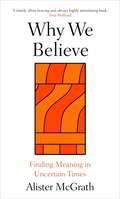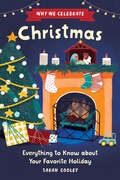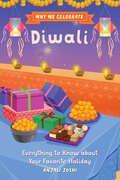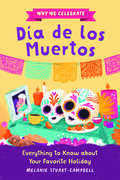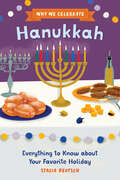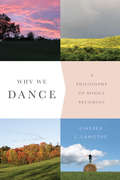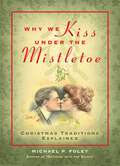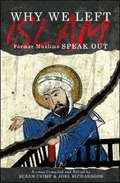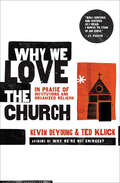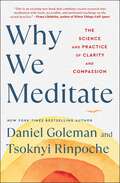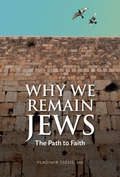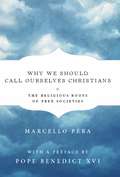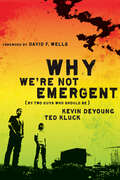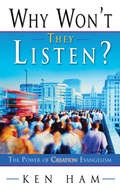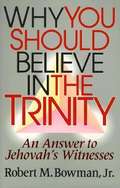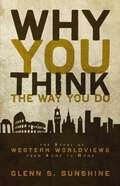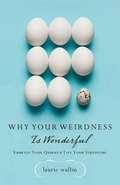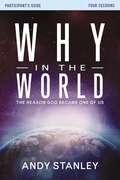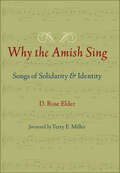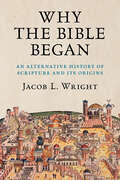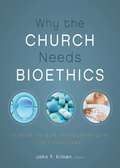- Table View
- List View
Why We Believe: Finding Meaning in Uncertain Times
by Prof. Alister McGrathBelief: surely it&’s a relic from the past, a hangover from a superstitious age that is totally out of sync with today&’s rational, science-led culture? 'A timely, often bracing and always highly stimulating book.' Tom Holland, author of Dominion and co-host of The Rest is History In today&’s science-driven, rational world, belief is dismissed as an artefact of a bygone era – something absurd at best, harmful at worst. The prevailing narratives paint belief as primitive, weird, even dangerous. But as life grows ever more confusing and our societies more atomised, contemplating something bigger than ourselves has never been more vital. Alister McGrath offers a fresh perspective on belief, presenting it not as a weakness of rational thought but as an essential tool for navigating uncertainty. Elegant and thought-provoking, Why We Believe reveals how belief provides meaning in the face of existential despair, how it fosters community and offers solace. As society moves beyond the dismissive rhetoric surrounding people of faith, here is a powerful manifesto for the re-enchantment of the Western mind. 'Scholarly, compulsively readable and with gems of information on every page... a must read.' Revd Fergus Butler-Gallie, author of A Field Guide to the English Clergy
Why We Celebrate Christmas: Everything to Know about Your Favorite Holiday (Why We Celebrate)
by Sarah CooleyCelebrate Christmas with this festive introduction for kids ages 6 to 9!Christmas is a magical time of year for people all over the world. They decorate their homes, sing songs, give gifts, and spend time together! Learn all about the history, traditions, food, and more with this book of facts and activities that encourage you to join in on the fun.So many ways to get festive—Discover how Christmas is celebrated by different people around the world with parties, music, decorations, and presents.Celebrate at home—Kids will explore Christmas customs with included activities like making Reindeer Cookies, crafting Christmas trees out of yarn, and playing a stocking stuffer guessing game.Fascinating facts and pictures—Vibrant illustrations and kid-friendly language help bring Christmas to life.Discover Why We Celebrate Christmas!Have you ever wondered why we exchange gifts on Valentine's Day? Or why we wear green on St. Patrick's Day? Get the rest of the Why We Celebrate series and learn about holidays from around the world!
Why We Celebrate Diwali: Everything to Know about Your Favorite Holiday (Why We Celebrate)
by Anjali JoshiCelebrate Diwali with this festive introduction for kids ages 6 to 9!Diwali, also known as the Festival of Lights, is a five-day celebration of good over evil. It's one of the most popular holidays in India and is celebrated by many different people all over the world. Learn all about the history, traditions, food, and more with this book of facts and activities that encourage you to join in on the celebration.So many ways to get festive—Discover how Diwali is celebrated with lights, prayers, and parties. Celebrate at home—Explore Diwali customs with included activities like making ladoos and a clay diya candle holder.Fascinating facts and pictures—Vibrant illustrations and kid-friendly language help bring Diwali to life.Discover Why We Celebrate Diwali!Have you ever wondered why we wear green on St. Patrick's Day? Or why we hang stockings for Christmas? Get the rest of the Why We Celebrate series and learn about holidays from around the world!
Why We Celebrate Día de los Muertos: Everything to Know about Your Favorite Holiday (Why We Celebrate)
by Melanie Stuart-Campbell Javiera Mac-lean AlvarezCelebrate Día de los Muertos with this festive introduction for kids ages 6 to 9!Día de los Muertos, or Day of the Dead, is a holiday where people celebrate and remember their loved ones who have passed on. The festivities happen over two days every year and are full of color and joy! Learn all about the history, traditions, food, and more with this book of facts and activities that encourage you to join in on the celebration.So many ways to get festive—Discover how Día de los Muertos is celebrated in Mexico and around the world by building ofrendas, or altars, for loved ones, decorating with flowers and skulls, and playing music.Celebrate at home—Explore Día de los Muertos customs with included activities like making your own pan de muerto and paper marigolds!Fascinating facts and pictures—Vibrant illustrations and kid-friendly language help bring Día de los Muertos to life.Discover Why We Celebrate Día de los Muertos!Have you ever wondered why we wear green on St. Patrick's Day? Or why we hang stockings for Christmas? Get the rest of the Why We Celebrate series and learn about holidays from around the world!
Why We Celebrate Hanukkah: Everything to Know about Your Favorite Holiday (Why We Celebrate)
by Stacia DeutschCelebrate Hanukkah with this festive introduction for kids ages 6 to 9!Hanukkah is a Jewish holiday that is also called the Festival of Lights. For thousands of years, Jewish people have celebrated Hanukkah by lighting candles, chanting prayers, and playing games! Learn all about the history, traditions, food, and more with this book of facts and activities that encourage you to join in on the fun.So many ways to get festive—Discover how Hanukkah is celebrated by different people around the world with songs, gifts, and gatherings.Celebrate at home—Kids will explore Hanukkah customs with included activities like making your own stained-glass menorah decoration and learning how to play dreidel.Fascinating facts and pictures—Vibrant illustrations and kid-friendly language help bring Hanukkah to life.Discover Why We Celebrate Hanukkah!Have you ever wondered why we exchange gifts on Valentine's Day? Or why we wear green on St. Patrick's Day? Get the rest of the Why We Celebrate series and learn about holidays from around the world!
Why We Dance: A Philosophy of Bodily Becoming
by Kimerer LaMotheWithin intellectual paradigms that privilege mind over matter, dance has long appeared as a marginal, derivative, or primitive art. Drawing support from theorists and artists who embrace matter as dynamic and agential, this book offers a visionary definition of dance that illuminates its constitutive work in the ongoing evolution of human persons. Why We Dance introduces a philosophy of bodily becoming that posits bodily movement as the source and telos of human life. Within this philosophy, dance appears as an activity that humans evolved to do as the enabling condition of their best bodily becoming. Weaving theoretical reflection with accounts of lived experience, this book positions dance as a catalyst in the development of human consciousness, compassion, ritual proclivity, and ecological adaptability. Aligning with trends in new materialism, affect theory, and feminist philosophy, as well as advances in dance and religious studies, this work reveals the vital role dance can play in reversing the trajectory of ecological self-destruction along which human civilization is racing.
Why We Kiss under the Mistletoe: Christmas Traditions Explained
by Michael P. FoleyFrom the famed author of international bestseller Drinking with the Saints, every Christmas tradition explained and celebrated, as well as a glimpse into all the sometimes macabre and always fascinating nooks and crannies of the holiday. Deepen your knowledge of and love for Christmas!The definitive guide to every question you&’ve had about the Christmas holiday—and many more you&’ve never thought to ask! In Why We Kiss Under the Mistletoe, bestselling author Michael Foley dives deep into the history of Christmas and the customs that surround this beloved holiday. Learn about the fascinating origins of your favorite Christmas food, drink, observances, and songs. Discover how Saint Nicolas, a fourth-century Catholic bishop, became Santa Clause and who Santa&’s global competitors are (some of them will shock you). And dig into the forbidden history of the Yuletide season&’s dark and ghoulish side. Witty, imaginative, and wholly unique, Why We Kiss Under the Mistletoe is the stocking stuffer that will be revisited every year.
Why We Left Islam: Former Muslims Speak Out
by Joel Richardson Susan CrimpOne day, an American on the verge of converting to Islam said to one of the editors, Please, I fear I am about to make the biggest mistake of my life. Please give me one solid reason not to convert. This is the book Joel Richardson wishes he had at that moment. <P><P>Powerful, often shocking but always heartfelt, these essays from over a dozen individuals who have left Islam -- often in fear for their lives -- are remarkable for their honesty. <P><P>The stories of how these men and women freed themselves from this repressive and brutal religion are not just inspirational, but present a searing challenge to those Westerners determined to perpetuate the Islam is a religion of peace myth at all costs.
Why We Love the Church: In Praise of Institutions and Organized Religion
by Ted Kluck Kevin DeYoungThis book presents the case for loving the local church. It paints a picture of the local church in all its biblical and real life guts, gaffes, and glory in an effort to edify local congregations and entice the disaffected back to the fold. It also provides a solid biblical mandate to love and be part of the body of Christ and counteract the "leave church" books that trumpet rebellion and individual felt needs. Why We Love the Church is written for four kinds of people - the Committed, the Disgruntled, the Waffling & the Disconnected.
Why We Love the Church: In Praise of Institutions and Organized Religion
by Ted Kluck Kevin DeYoungThis book presents the case for loving the local church. It paints a picture of the local church in all its biblical and real life guts, gaffes, and glory in an effort to edify local congregations and entice the disaffected back to the fold. It also provides a solid biblical mandate to love and be part of the body of Christ and counteract the "leave church" books that trumpet rebellion and individual felt needs. Why We Love the Church is written for four kinds of people - the Committed, the Disgruntled, the Waffling & the Disconnected.
Why We Meditate: The Science and Practice of Clarity and Compassion
by Daniel Goleman Tsoknyi RinpocheA practical and soul-stirring guide to meditation that offers a much-needed antidote to the forces of stress that overwhelm so many of us—from the New York Times bestselling author of the &“thoughtfully written, persuasive&” (USA TODAY) Emotional Intelligence and renowned meditation teacher, Tsoknyi Rinpoche.We all experience negative emotions from time to time. But in a world with as much frenzy and pressure as ours, it&’s incredibly easy for these same emotions to become destructive. Now, by blending Eastern tradition with Western science, Why We Meditate effortlessly helps you embrace and understand meditation as never before. With accessible and eye-opening advice based on groundbreaking neuroscience, this guidebook helps you not only break free from negative patterns of thought and behavior but radically embrace your very being. Revolutionize your health, relationships, and soul with this book that is perfect for both serious meditators and those new to the practice.
Why We Remain Jews: The Path To Faith
by Vladimir TsesisDr. Tsesis describes the path he traversed from religious ignorance to strong belief in the Jewish religion. Tsesis assigns a special place to the proof of his conclusion that religion and science—especially in light of recent discoveries—are not antagonists, and are, in fact, in complete harmony, supplementing and not excluding each other. In the spirit of ecumenism Tsesis speaks about coexistence of different religions, which share the common objective of assurance of perpetual survival of the human race. The unifying theme of this book, however, is the beauty of the Jewish religion and a possible answer to the question of why we remain Jews.
Why We Should Call Ourselves Christians
by Marcello PeraThe intellectual and political elite of the West is nowadays taking for granted that religion, in particular Christianity, is a cultural vestige, a primitive form of knowledge, a consolation for the poor minded, an obstacle to coexistence. In all influential environments, the widespread watchword is "We are all secular" or "We are all post-religious." As a consequence, we are told that states must be independent of religious creed, politics must take a neutral stance regarding religious values, and societies must hold together without any reference to religious bonds. Liberalism, which in some form or another is the prevailing view in the West, is considered to be "free-standing," and the Western, liberal, open society is taken to be "self-sufficient."Not only is anti-Christian secularism wrong, it is also risky. It's wrong because the very ideas on which liberal societies are based and in terms of which they can be justified-the concept of the dignity of the human person, the moral priority of the individual, the view that man is a "crooked timber" inclined to prevarication, the limited confidence in the power of the state to render him virtuous-are typical Christian or, more precisely, Judeo-Christian ideas. Take them away and the open society will collapse. Anti-Christian secularism is risky because it jeopardizes the identity of the West, leaves it with no self-conscience, and deprives people of their sense of belonging. The Founding Fathers of America, as well as major intellectual European figures such as Locke, Kant, and Tocqueville, knew how much our civilization depends on Christianity. Today, American and European culture is shaking the pillars of that civilization.Written from a secular and liberal, but not anti-Christian, point of view, this book explains why the Christian culture is still the best antidote to the crisis and decline of the West. Pera proposes that we should call ourselves Christians if we want to maintain our liberal freedoms, to embark on such projects as the political unification of Europe as well as the special relationship between Europe and America, and to avoid the relativistic trend that affects our public ethics. "The challenges of our particular historical moment", as Pope Benedict XVI calls them in the Preface to the book, can be faced only if we stress the historical and conceptual link between Christianity and free society.
Why We're Not Emergent: By Two Guys Who Should Be
by Ted Kluck Kevin DeYoung"You can be young, passionate about Jesus Christ, surrounded by diversity, engaged in a postmodern world, reared in evangelicalism and not be an emergent Christian. In fact, I want to argue that it would be better if you weren't."The Emergent Church is a strong voice in today's Christian community. And they're talking about good things: caring for the poor, peace for all men, loving Jesus. They're doing church a new way, not content to fit the mold. Again, all good. But there's more to the movement than that. Much more.Kevin and Ted are two guys who, demographically, should be all over this movement. But they're not. And Why We're Not Emergent gives you the solid reasons why. From both a theological and an on-the-street perspective, Kevin and Ted diagnose the emerging church. They pull apart interviews, articles, books, and blogs, helping you see for yourself what it's all about.
Why We're Not Emergent: By Two Guys Who Should Be
by Ted Kluck Kevin DeYoung"You can be young, passionate about Jesus Christ, surrounded by diversity, engaged in a postmodern world, reared in evangelicalism and not be an emergent Christian. In fact, I want to argue that it would be better if you weren't."The Emergent Church is a strong voice in today's Christian community. And they're talking about good things: caring for the poor, peace for all men, loving Jesus. They're doing church a new way, not content to fit the mold. Again, all good. But there's more to the movement than that. Much more.Kevin and Ted are two guys who, demographically, should be all over this movement. But they're not. And Why We're Not Emergent gives you the solid reasons why. From both a theological and an on-the-street perspective, Kevin and Ted diagnose the emerging church. They pull apart interviews, articles, books, and blogs, helping you see for yourself what it's all about.
Why Won't They Listen?
by Ken HamA lot of time and money is spent by Christians who have a passion to spread the gospel. Across the globe, this effort is paying off as seekers find Christ, the source of truth and peace. In many cultures, though, appeals made on behalf of the Christian faith are met with blank stares, indifference, even mocking hostility. Ken Ham, one of Christendom's most astute observers of evangelism, is convinced that compromise with evolutionary world views has virtually crippled preaching and teaching efforts, especially in Western societies. In this truly bold book, Ham presents an ambitious plan to fulfill the Great Commission. A compelling writer and speaker, Ham deftly exposes the great flaws of Darwinism, and shows how compromise with this philosophy of death is killing the Church. By the jungle of tangled views of reality, and helps committed Christians see the path to effective evangelism.
Why You Can Disagree and Remain a Faithful Catholic
by Philip S. KaufmanThis popular bestseller has been greatly revised and expanded to include new insights on conscience, infallibility, and the Catechism of the Catholic Church.
Why You Should Believe in the Trinity: An Answer to Jehovah's Witnesses
by Robert M. BowmanA balanced response to the Watchtower booklet, Should You Believe in the Trinity? Robert Bowman points out that if the arguments presented in the booklet are sound, "the doctrine of the Trinity should be rejected by all Christians. However, if those arguments are not sound, the possibility ought to be considered that the Trinity is a biblical and Christian doctrine after all." Bowman covers questions such as: What is the practical significance of the Trinity? Are people who believe in the Trinity polytheists? Is Jesus God? Is the Holy Spirit merely and impersonal force? While not an exhaustive study on the subject, this book offers brief responses to the points raised in the Jehovah's Witness booklet. It provides a summary of what the Bible teaches about the nature of God, and can be helpful for anyone who wishes to know God better.
Why You Think the Way You Do: The Story of Western Worldviews from Rome to Home
by Charles Colson Glenn S. SunshinePeople often talk about worldview when describing the philosophy that guides their lives. But how have we come by our worldviews, and what impact did Christianity have on those that are common to Western civilization? This authoritative, accessible survey traces the development of the worldviews that underpin the Western world. It demonstrates the decisive impact that the growth of Christianity had in transforming the outlook of pagan Roman culture into one that, based on biblical concepts of humanity and its relationship with God, established virtually all the positive aspects of Western civilization. The two-pronged assault in our time on the biblically based worldview by postmodern philosophy and the writings of neo-atheists has made it even more crucial that we acknowledge and defend its historical roots. Unique among books on the topic, this work discusses Western worldviews as a continuous narrative rather than as simply a catalogue of ideas, and traces the effects changes in worldview had on society. It helps readers understand their own worldviews and those of other people and helps them recognize the consequences that worldviews hold. Professors, students, and armchair historians alike will profit from this book.
Why Your Weirdness Is Wonderful
by Laurie WallinWhat if who you are right now is exactly who God meant you to be? What if the weirdest, most annoying things about you are actually--for a purpose? Often we lament about how we relate to God and to the world. We over-think things, worry too much, put things off, argue too much, talk too much, or any number of other griefs. We fight who we are and beg God to make us different. But what if our greatest strength, biggest gift, and most potential is hidden in the very thing we seek to hide from the rest of the world: our weirdness? In Why Your Weirdness Is Wonderful, author and certified life coach Laurie Wallin reveals strategies for anyone struggling to find a calling or to find and live their dream. It teaches us to stop fighting ourselves and start following God, not just in spite of, but by embracing our "weirdness.
Why a Crown? (The Little Books of Why)
by Bodie Thoene Brock ThoeneWhy was Jesus made to wear a crown, and why was it made of thorns? This book considers the crown that Jesus wore, the significance of crowns to the Romans, and considers the relevance of every aspect of Easter week. Easy-to-read, fascinating, instructive, inspiring.
Why in the World Participant's Guide: The Reason God Became One of Us
by Andy StanleyIn this four-session video Bible study (DVD/digital video sold separately), bestselling author and pastor Andy Stanley takes a closer look at one of the unique things Christians believe: God became one of us. Why in the world would God do that? Why would God leave the comfort and recognition of heaven to live on this ball of dirt in a time before morphine and indoor plumbing when the best of conditions barely paralleled the worst of modern-day conditions? Why?We think we know why He died. But what compelled him to live as one of us?Sessions include:To Communicate and DemonstrateLike Son, Like FatherClasslessPutting Religion in Its PlaceAs the founder of North Point Ministries—comprised of six churches in the Atlanta area serving more than 36,000 people weekly, as well as a network of 30 churches around the globe—Andy Stanley is uniquely positioned to reach an engaged and ever-growing ministry.Designed for use with the Why in the World Video Study (sold separately).
Why the Amish Sing: Songs of Solidarity and Identity (Young Center Books in Anabaptist and Pietist Studies)
by D. Rose ElderAn intimate portrait of the diverse music-making at the center of Amish faith and life.Singing occurs in nearly every setting of Amish life. It is a sanctioned pleasure that frames all Amish rituals and one that enlivens and sanctifies both routine and special events, from household chores, road trips by buggy, and family prayer to baptisms, youth group gatherings, weddings, and "single girl" sings. But because Amish worship is performed in private homes instead of public churches, few outsiders get the chance to hear Amish people sing. Amish music also remains largely unexplored in the field of ethnomusicology. In Why the Amish Sing, D. Rose Elder introduces readers to the ways that Amish music both reinforces and advances spiritual life, delving deep into the Ausbund, the oldest hymnal in continuous use. This illuminating ethnomusicological study demonstrates how Amish groups in Wayne and Holmes Counties, Ohio—the largest concentration of Amish in the world—sing to praise God and, at the same time, remind themselves of their 450-year history of devotion. Singing instructs Amish children in community ways and unites the group through common participation. As they sing in unison to the weighty words of their ancestors, the Amish confirm their love and support for the community. Their singing delineates their common journey—a journey that demands separation from the world and yielding to God's will.By making school visits, attending worship services and youth sings, and visiting private homes, Elder has been given the rare opportunity to listen to Amish singing in its natural social and familial context. She combines one-on-one interviews with detailed observations of how song provides a window into Amish cultural beliefs, values, and norms.
Why the Bible Began: An Alternative History of Scripture and its Origins
by Jacob L. WrightWhy did no other ancient society produce a text remotely like the Bible? That a tiny, out of the way community, could have produced a text so determinative for peoples across the globe seems improbable.For Jacob Wright, the Bible is not only a testimony of survival, but also an unparalleled achievement in human history. Forged during Babylonian exile after the shattering destruction of Jerusalem, it makes not victory but total humiliation the foundation of a new idea of belonging. Lamenting the destruction of their homeland, scribes who composed the Bible turned to the golden ages of the past, reflecting deeply on abject failure. More than just religious scripture, the Bible is a resonant blueprint for the inspiring creation of a nation. As a response to catastrophe, it offers a powerful, message of hope and restoration that is unique in the Ancient Near Eastern and Greco-Roman worlds. Wright's Bible is thus a social, political, and even economic roadmap – one that enabled a small and obscure community located on the periphery of leading civilizations and empires, not just to come back from the brink, but ultimately to shape the world's destiny. The Bible speaks ultimately of being a united, yet diverse people, and its pages present a manual of pragmatic survival strategies in response to societal collapse.
Why the Church Needs Bioethics: A Guide to Wise Engagement with Life’s Challenges
by John F. KilnerIn a world where incredible medical technologies are possible … does “can do” mean “should do”? Why the Church Needs Bioethics helps you understand and constructively engage bioethical challenges with the resources of Christian wisdom and ministry. Three rich and true-to-life case studies illustrate the urgency of such bioethical issues as reproductive and genetic technologies, abortion, forgoing treatment, assisted suicide, stem cell research, and human enhancement technologies. Leading Christian voices bring biblical and theological perspective to bear on the incredible medical technologies available today; mobilize useful insights from health care, law, and business; and demonstrate the powerful ways the church can make a difference through counseling, pastoral care, intercultural ministry, preaching, and education. This book equips students, church and lay leaders, and people in health-related fields with the knowledge to make faithful bioethical decisions and to help foster a world where human beings are shown respect as people created in the image of God. Contributors to Why the Church Needs Bioethics include leading Bible and theology scholars, such as D. A. Carson and Kevin Vanhoozer; leaders in the areas of preaching (Greg Scharf) and ethics (Scott Rae); and 15 other experts in the fields of biblical-theological studies, ministry, communication, business, law, healthcare, and bioethics.
